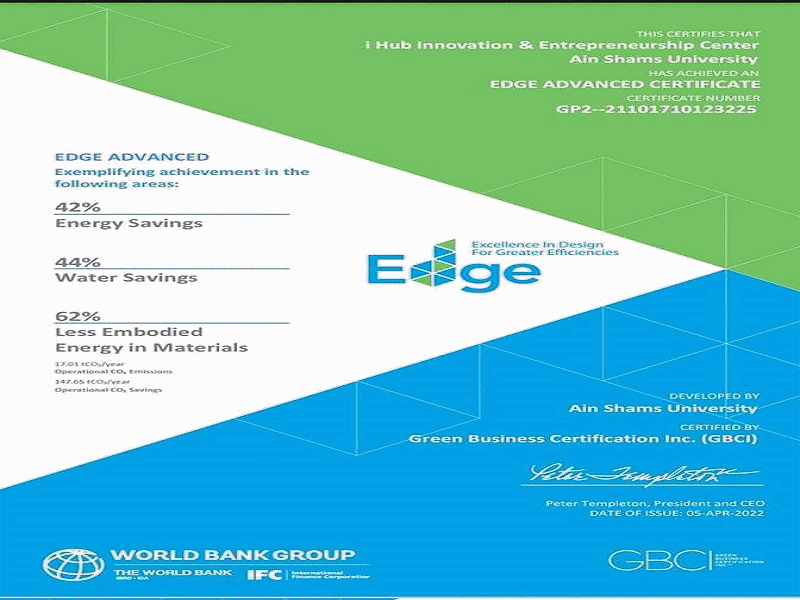The Innovation and Entrepreneurship Center is the first building in Egypt to be awarded the EDGE ADVANCED Certificate of Excellence in Design for Greater Efficiency
In line with Egypt’s Vision 2030 under the leadership of His Excellency President Abdel Fattah El-Sisi, and the belief of Ain Shams University in the importance of shifting towards the fourth generation of universities and the necessity of striving towards green transformation and taking into account the challenges of climate change, and in conjunction with the hosting of the Arab Republic of Egypt - representing the continent of Africa - for the United Nations Conference The 27th United Nations Climate Change Conference, COP27, which is scheduled to be held at the end of this year in Sharm El-Sheikh, has won the headquarters of the Innovation and Entrepreneurship Center of Ain Shams University - which was established by a decision of Prof. Dr. Mahmoud El-Metini; President of the University, with the support of the Central Bank of Egypt under the patronage of Mr. Tarek Amer; The Governor of the Central Bank, through the Nile Pioneers initiative and October 6 University, and with the implementation of the Egyptian Armed Forces and under the technical and engineering supervision of the Faculty of Engineering at Ain Shams University, obtained the EDGE ADVANCED certificate as the first building in the Arab Republic of Egypt to obtain this international certificate, as the building obtained the highest level of this certificate.
EDGE is a green building certification system developed by the International Finance Corporation, which is part of the World Bank. EDGE stands for Excellence in Design for Greater Efficiencies, and the certification has the goal of reducing the environmental impact of buildings in three areas: direct energy consumption, water consumption, and the energy footprint of construction materials.
EDGE was developed by the IFC to address the environmental footprint of the building sector, focusing on emerging economies. Buildings are responsible for 19% of energy-related emissions globally, and they consume 40% of electricity. Considering that most power grids still depend on fossil fuels, electricity consumption has a major environmental impact. The building sector is expected to double by 2050, and most of the growth will occur in emerging countries
To obtain this certification, a building must be 20% more efficient than standard buildings in the same area, where the building is evaluated in three categories: energy, water, and energy embodied materials. The Innovation and Entrepreneurship Center building achieved 42% energy savings, 44% water savings, and 62% energy savings embodied from materials, thus obtaining EDGE Advanced, the highest range in this certificate as a first precedent in the Arab Republic of Egypt in The EDGE certification field.
The Innovation and Entrepreneurship Center building was designed and implemented in cooperation between the Faculty of Engineering at Ain Shams University under the supervision of Prof. Dr. Omar Al-Husseini, Dean of the Faculty of Engineering and the Egyptian Armed Forces, through a comprehensive development process for the old restaurant building located inside the university city of Ain Shams University. The building was designed with the latest design systems Building Information Modeling BIM The design aims to create diverse and flexible spaces that provide an environment that supports the thought of innovation, entrepreneurship and employment similar to similar centers globally through the assignment of the Engineering Consultation Center headed by Prof. Dr. Yasser Megahed
Through an elite engineering advisory team consisting of Dr. Ayman Fareed and Dr. Hussein Fareed for architectural and interior design works, Dr. Ibrahim Hilal for electrical work, Dr. Ahmed El-Shimy for mechanical works and Dr. Gamal Hussain for construction works.
This is an initiative by Ain Shams University that aims to open the door for facilities in Egyptian universities in particular, and the built environment in general, to follow in the same footsteps towards buildings that are more environmentally friendly, believing in its leading role in the transition towards a green economy and preservation of the environment.
.svg)




